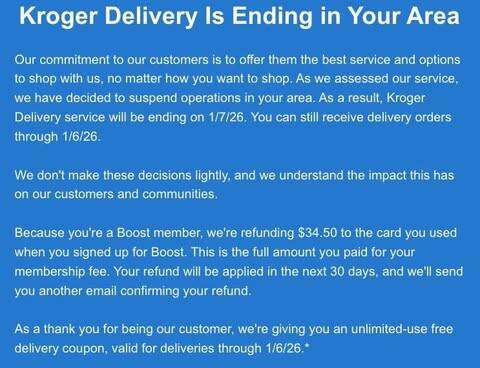
Kroger has announced it will cease its delivery operations in the Daytona Beach area beginning January 7, 2026, marking a notable retreat from a service that many local residents have come to depend on. The decision, communicated via direct customer notification, is part of a broader strategic reassessment of Kroger’s delivery footprint nationwide.
The company’s message framed the move as a difficult but necessary choice: “Our commitment to our customers is to offer them the best service and options to shop with us, no matter how you want to shop. As we assessed our service, we have decided to suspend operations in your area.” Customers will still be able to place delivery orders through January 6, 2026.
Kroger’s exit from the local delivery market raises questions about the future of grocery access for vulnerable populations, including seniors, individuals with disabilities, and working families who rely on home delivery for convenience and necessity. The decision also comes at a time when grocery delivery services have become increasingly competitive, with national players like Amazon Fresh, Walmart+, and Instacart expanding their reach and refining their logistics.
Boost members—subscribers to Kroger’s premium membership program—will receive a full refund of $34.50, the amount paid for their annual membership. Kroger confirmed that refunds will be processed within 30 days and that members will receive email confirmation once the transaction is complete. As a parting gesture, the company is offering an unlimited-use free delivery coupon valid through the final day of service.
The announcement has sparked concern among community advocates and local officials, who worry about the ripple effects on food accessibility and economic equity. “This isn’t just about convenience—it’s about access,” said one local civic leader. “We need to ensure that residents who depend on delivery services aren’t left behind.”
Kroger has not yet disclosed whether it plans to introduce alternative shopping options, such as expanded pickup services or third-party delivery partnerships, to mitigate the impact of the transition. The company’s broader delivery strategy remains unclear, though industry analysts suggest the move may reflect a shift toward more centralized fulfillment models in high-density markets.
As Daytona Beach prepares for the change, community organizations and city leaders may look to fill the gap through local initiatives, partnerships, or policy interventions aimed at preserving food access for all residents.
Add comment
Comments